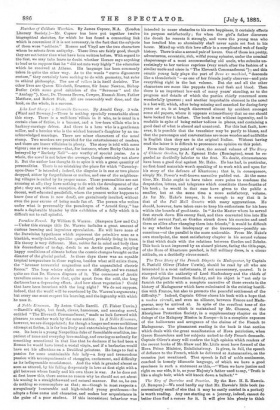A Noble Kinsman. By Anton Giulio Barrili. (T. Fisher Unwin.)
—Barrili's slight, but fresh, clever, humorous, and amusing novel, entitled " The Eleventh Commandment," made us look forward with pleasure to another work by the same author. In A Noble Kinsman, however, we are disappointed ; for though a longer and more ambitions attempt at fiction, it is far less lively and entertaining than the former one. Its hero is a young Neapolitan duke of formidable erudition, im- patient of tame and everyday love-making, and craving so ardently for something sensational in that line that he declares if he had been a Roman be would have loved a vestal virgin, and if a barbarian would have set his affections on a Druidical priestess. He longs to feel a passion for some unattainable fair lady—a fiery and tremendous passion with accompaniments of struggles, excitement, and difficulty as its indispensable nourishment. And the wish is granted almost as soon as uttered, by his falling desperately in love at first sight with a girl between whose family and his own there is war. As he does not at first know this, there seems no reason why he should not set about his wooing in a straightforward and natural manner. But no, he can do nothing so commonplace as that ; so—though in most respects a scrupulously honourable and high-minded young gentleman—he adopts a false name and character, and makes her acquaintance in the guise of a poor student. If this inconsistent behaviour was intended to cause obstacles to his own happiness, it certainly effects its purpose satisfactorily ; for when the girl's father discovers the deceit he resents it strongly, and vows the young man who has insulted him so abominably shall never again set foot in his house. Mixed up with this love affair is a complicated web of family history. There is also a second pair of lovers. One of these is a pretty, adventurous, eccentric, rich, wilful young spinster, under the nominal chaperonage of a most accommodating old uncle, who submits un- resistingly to her various caprices (very much after the fashion of a similar uncle and niece in "The Eleventh Commandment ") ; and this erratic young lady plays the part of Deus ex machind, "descends like a thunderbolt "—as one of her friends justly observes—and puts everything right in the last volume. But she and all the other characters are more like puppets than real flesh and blood. Then there is an important law-suit of many years' standing, as to the progress and details of which the parties chiefly concerned seem wonderfully ignorant ; and another improbable element in the novel is a lost will, which, after being missing and searched for during forty years or so, is at length discovered almost by accident amongst some old papers, where it appears extraordinary that no one should have looked for it before. The book is not without ingenuity, and is readable in spite of being rather tedious in places, and containing a good deal of what is absurd and unnatural. For this last fault, how- ever, it is possible that the translator may be partly to blame, and that the personages and conversations are more wooden and unlifelike in English than they are in the original Italian. Without having read the latter it is difficult to pronounce an opinion on this point.
From the literary point of view, the second volume of The Story of Chinese Gordon, by A. Egmont Hake (Remington), must be re- garded as decidedly inferior to the first. No doubt, circumstances have been a good deal against Mr. Hake. He has had, in particular, no first-hand materials worth speaking of to work with and upon for his story of the defence of Khartoum ; that is, in consequence, simply Mr. Power's well-known narrative padded out. At the same time, Mr. Hake ought to have taken more pains to condense the despatches, letters, and telegrams which constitute three-fourths of his book ; he would in that case have given to the public a smaller, but at the same time a more satisfactory, volume. As for Mr. Hake's temper, it is enough to say that it is that of the Pall Mall Gazette with many aggravations. He should, however, have taken care to keep his enthusiasm for his hero within the bounds of good-taste. In "As the Master whom he served first struck down His enemy Saul, and then converted him into His faithful servant Paul, so Gordon struck down his enemies and used them as allies after changing them into friends," it would be difficult to say whether the inadequacy or the irreverence—possibly un- conscious—of the parallel is the more noticeable. From Mr. Hake's own standpoint, the most satisfactory chapter in his second volume is that which deals with the relations between Gordon and Zebehr. This book is not improved by an absurd picture, facing the title-page, of the Hero of Khartoum perched, in full military dress, in a circus attitude, on a decidedly circus camel.


































 Previous page
Previous page